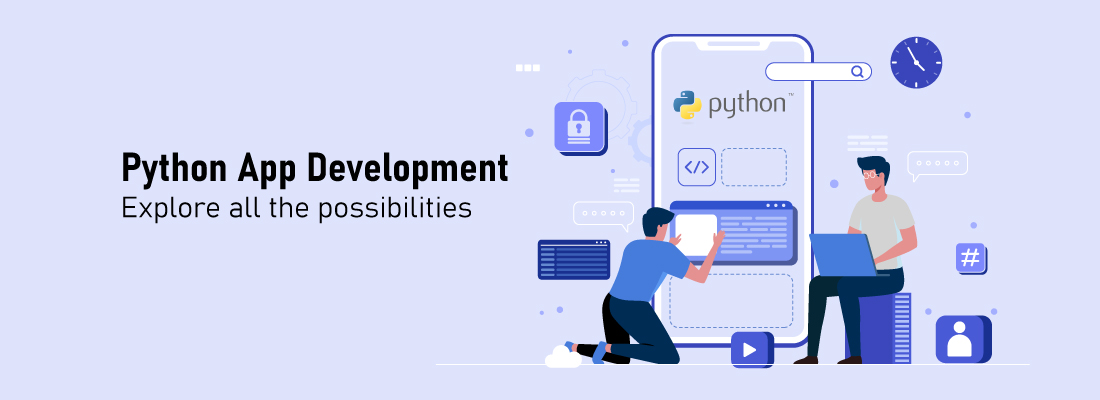Top Apps with Python - Explore all the possibilities.

A high-level general-purpose programming language like Python can be used to address a variety of problems.
It should be able to satisfy the requirements of the majority of applications.
Python is widely used by developers to create apps.
It had previously been crowned the best programming language, outclassing Java itself.
In the most dynamic and successful businesses, Python is a preferred technology.
 So, let’s take the route of expertise and check different types of applications that can be developed using Python.
So, let’s take the route of expertise and check different types of applications that can be developed using Python.
What Kinds of Applications Can You Create in Python?
1. Blockchain Apps with Python
One of the most popular technological revolutions of this decade, blockchain, has completely taken over the industry. Blockchain creation is not as simple as shelling peas, at least not from the developer's perspective. However, it is now actually possible thanks to Python programs. Developers can establish endpoints for various blockchain functions by using Python frameworks like Flask to connect with their blockchain over the Internet using HTTP requests. With the use of Python, developers can also run the scripts on many computers to create a decentralized network.2. Command-line applications
Applications that run on the command line and console applications are identical. It is a computer application that lacks a graphical user interface and was designed to be used through the command line or a shell. Because of its Read-Eval-Print-Loop (REPL) functionality, which enables developers to assess the language and discover new possibilities, Python is seen as an appropriate language for such applications. Top app development firms have access to a vast array of free Python libraries because Python is a widely used language, that they can employ to create command-line applications.3. Audio and Video applications
Python-based mobile app development makes it easier to make audio and video applications for music and other purposes. Python can be used to analyze all of the audio and video content that is available on the internet. The effective completion of the app development is also made possible by some Python libraries, such as PyDub and OpenCV. So, it should be clear by now how amazing and effective this language is at producing high-performance programs.4. Business Software
Python-based applications strongly encourage practical agility, which is why they also help with ERP and e-commerce app development. Python is used in many management software applications. Python makes it so simple to design these kinds of apps, which is why app development businesses use it.5. System administration applications
System Administration applications are indeed a savior for management. Because it enables easy communication with the operating system, Python mobile app development is thought to be ideal for developing system management apps. It helps developers to interface with the Operating system on which Python is currently running. This language facilitates easy reading and writing to the file system as well as any other IO activities.6. Machine learning applications
Development in machine learning is another fascinating technological trend of this decade. Machine learning is an algorithm technique that feeds information to operating systems and empowers them to make intelligent decisions. Until recently, developing machine learning applications was a difficult effort, but today we have Python mobile app development. Python has several machine learning packages like Pandas and Scikit that can be used for free under the GNU license. With the assistance of these extremely capable and efficient libraries, developers can design machine learning apps with a basic understanding of Python mobile app development.Other Use Cases of Python Language
1. Software and Web development
Python's code is straightforward to grasp, which simplifies web and software development services and increases process efficiency. Another charming characteristic of Python is its compatibility to integrate with other languages, which makes it a more versatile option. Some efficient frameworks, such as Django and Pyramid, help programmers build Python-based apps and let them build web applications from scratch.2. OCR and image processing
Python has incredible object identification and image processing capabilities. The development of Python-based apps with built-in deep learning and computer vision capabilities has become incredibly efficient thanks to a wide variety of Python libraries, including PyTesseract for OCR, Python Imaging Library, and TensorFlow for object detection.3. Automated testing
Python is the preferred language for automating testing. Automated testing is a process of execution of the applications’ features using a script instead of a human being. In this sense, Python offers a wide range of libraries and tools to do automated testing, along with Selenium (a web-based automated tool).4. Web crawlers
Web Crawlers also referred to as Spiderbot, are usually used to make a duplicate copy of all the visited pages of the web for later preparation by a search engine. This will index the pages that were downloaded, enabling quick searches. In reality, crawlers help automate website maintenance activities. Examples include verifying HTML code or inspecting URLs. Python is thought to be the best language for building these Spiderbots because of its clean, quick code and accessibility to excellent resources.
